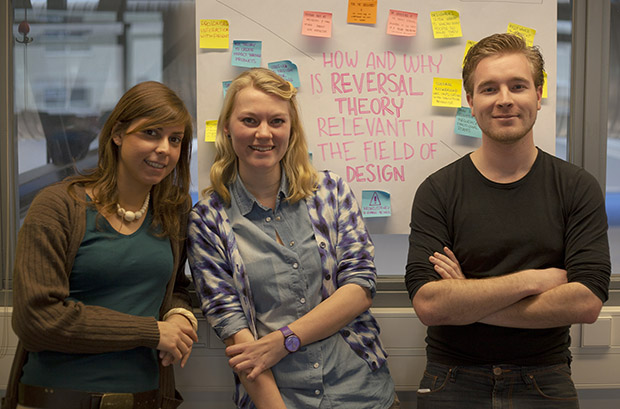On 1 March, three graduation students started a 6-9 months project in which they will apply Reversal theory to design a better in-flight experience for KLM, with a special focus on increasing the passenger’s mental energy levels and well-being. For this project the students write their thesis and conclude their Master courses Integrated Product Design and Design for Interaction. In the first part of the project, the students will study Reversal theory and other relevant models. This phase ends with the development of a tool that gives other designers the opportunity to apply the insights of Reversal Theory to design. In the second phase, each student continues individually with a specific design case for KLM.
The focus of all three projects is to apply the insights of Reversal theory, a psychological theory that deals with the constant changes in people’s emotions, motivations and behavior, rather than seeing people as static beings that have simple needs. This makes the theory especially powerful to answer psychologically complex questions like: Why and how do people’s needs change drastically sometimes? What is the link between emotions and mental energy? How can design influence people’s motivations and actions? Central to Reversal theory is a system of motivational states. The state that a person is in sometimes, determines what that person wants and feels. For instance, sometimes people are risk-averse, and will experience fear in the face of risk, but they can also be risk-seeking, and experience excitement. Reversal theory asserts that all emotions have such an underlying motivational state.
In the second phase of the project, the three students study and redesign three different aspects of the in-flight experience of KLM. The first project will focus on the interaction that happens between the cabin crew and passengers, and will consider the motivations, behavior and emotions of both crew and passenger. The second project will look at the balance of social engagement and privacy between passengers. Often people traveling find themselves sitting next to unfamiliar people, which means they are reluctant to interact. The third project focuses on the different ways passengers are and can be stimulated over the duration of the flight. Reversal theory hypothesizes that ‘psychodiversity’ is one of the most important aspects of energy and well-being, an aspect that is mostly lacking in the current in-flight experience.
Students: Roderick Huijgen, Ilaria Scarpellini and Fleur van Midwoud
Project Chair: Pieter Desmet
Project Mentor: Steven Fokkinga
Company: KLM




